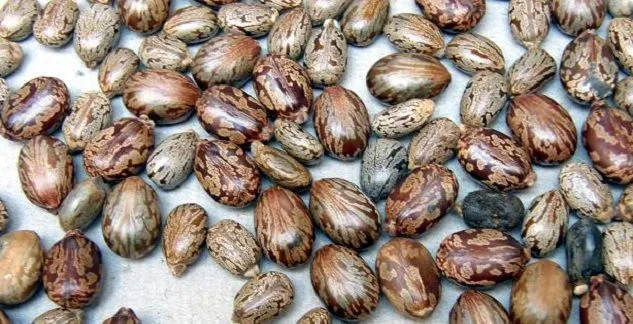Castor oil is widely recognized for its diverse applications. This versatile extract is used not only for enhancing human health but also in industrial settings to protect plastics and as a combustion medium for engines.
Castor is regarded as a multipurpose plant, offering a broad range of medicinal benefits through the use of its oil.
In this discussion, we will explore the plant and uncover the numerous properties of castor oil, which are far from negligible.
Table of Contents
What Is Castor Oil Used For?
Many people might not be familiar with the morphology of the castor plant. It is considered a shrub due to its development, characterized by thick, woody stems.
Its scientific name is Ricinus communis, and it belongs to the Euphorbiaceae family.
The plant originates from India, though it is also found in regions of the Horn of Africa and in Asian countries such as Vietnam.
Today, it is widespread in almost all warm climates with no frost.
Castor oil is well-known for its medicinal properties.

The properties of castor oil stem from its ability to convert ricin, which is potentially toxic, into fatty oils that offer excellent moisturizing, firming, antimicrobial, and anti-inflammatory benefits.
What Do We Know About the Properties of Castor Oil?
First and foremost, castor oil is extracted by pressing the seeds of the castor plant.
Toxicity of Castor Seeds
Castor seeds contain a high level of ricin, a plant protein that is toxic to both humans and animals. Ricin can cause severe gastroenteritis, and damage to the liver and kidneys, and has been responsible for several deaths due to high consumption.
During the production of castor oil, the extract is heated to reduce and eliminate ricin, rendering it non-toxic.
Castor oil is rich in ricinoleic acid, a compound typical of Ricinus communis, which makes it an effective purgative with analgesic and anti-inflammatory properties.
In modern medicine, castor oil, due to its high ricinoleic acid content, is used to coat bandages and surgical adhesives for its bactericidal properties and ability to control cytolysis (cell rupture).
In many parts of the world, castor oil is also referred to as “beaver oil.” This oil typically contains 45-50% of the pressed castor seeds and boasts a ricinoleic acid concentration of over 70%.
Ricinoleic Acid

An interesting fatty acid found naturally in the castor bean (Ricinus communis) is ricinoleic acid.
Due to its purgative potential, many laxative medications and other drugs with antimicrobial, anti-inflammatory, and analgesic properties are based on this unsaturated fatty acid.
In summary, when used at indicated doses and with specific treatments, castor oil can be beneficial for certain conditions. When purchasing castor oil, it is important to verify its origin and the chemical processes it has undergone.
The composition of castor oil that contributes to its properties is as follows:
- Ricinoleic acid: 85-95%
- Oleic acid: 1-6%
- Linoleic acid: 1-5%
- Linolenic acid: 0.5-2%
- Stearic acid: 0.5-1%
- Palmitic acid: 0.5-1%
- Dihydroxystearic acid: 0.3-0.5%
- Other: 0.2-0.5%
12 Properties of Castor Oil
Laxative Effect
Castor oil is known for its strong laxative effect, primarily due to ricin and ricinoleic acid. These compounds stimulate the digestive tract, promoting rapid evacuation of its contents. To achieve a purgative effect, a common dose is between 10 to 30 ml of castor oil. The laxative effects generally begin within 2 hours of consumption.
Increases Capillary Density
Castor oil enhances capillary density in areas where it is applied, such as the beard, scalp, eyelashes, or eyebrows. This increase in capillary density can give a fuller appearance due to improved hydration.
Relieves Arthritis and Muscle Aches
When used in massage, castor oil helps reduce inflammation in affected areas and provides analgesic relief. Its application, combined with massage, also offers a relaxing effect and aids in the complete absorption of its beneficial compounds.
Reduces Dark Circles and Firms Skin
The fatty acids in castor oil, including oleic, linoleic, and linolenic acid, have firming properties. They soften and deeply moisturize the skin. To reduce dark circles and tighten the skin, apply a drop of castor oil under each eye and gently massage until fully absorbed.
Reduces Dandruff
Castor oil is effective in moisturizing the scalp, which can help reduce dandruff. When used as a conditioner, it not only helps with dandruff but also improves overall scalp health and reduces hair loss.
Firming for Stretch Marks
Castor oil’s firming properties are beneficial for reducing the appearance of stretch marks, whether from pregnancy or significant weight loss. Apply a few drops directly to the skin and massage until fully absorbed. The omega-3 fatty acids in the oil support skin firmness and improve blood circulation.

Antimicrobial
Scientific studies have highlighted the antimicrobial potential of castor oil, largely due to ricinoleic acid. This compound helps in controlling cytolysis and limiting bacterial growth, making it useful in medical applications. Castor oil is often used to impregnate surgical materials such as gauze, adhesives, and bandages. When applied to healing wounds, it reduces pain, promotes healing, and helps prevent infections.
Anti-inflammatory and Analgesic
Ricinoleic acid in castor oil also has well-documented anti-inflammatory properties. It effectively reduces skin inflammation caused by joint damage, wounds, and sunburns. Additionally, it provides pain relief due to its mild analgesic effect. A simple massage with a few drops of castor oil on the affected area can provide quick relief.
Muscle Relaxant
After intense physical activity, a massage with castor oil can stimulate blood circulation and hydrate the skin. This helps alleviate muscle pressure and soreness, offering soothing relief.
Softens Hard Skin
The essential fatty acids in castor oil, including oleic, linoleic, and linolenic acids, penetrate deeply into the skin. This helps reduce dryness and soften hardened areas. After using a pumice stone to remove rough skin, applying castor oil can significantly improve skin texture and firmness.
Relieves Insect Bites
For insect bites, castor oil provides a comprehensive solution with its hydrating, analgesic, anti-inflammatory, and antibacterial properties. Applying 1 or 2 drops directly to the bite and massaging it in can help reduce pain, swelling, and the risk of infection, often showing improvement within minutes.
Soothes Sunburn
Castor oil can be a helpful remedy for sunburned skin. It aids in hydration, reduces redness, and soothes inflammation. After cooling the skin with cold water, lightly massage the affected area with castor oil. This can alleviate discomfort and improve skin condition within about 10 minutes.
- NOURISHING OIL: Loaded with multiple Omega fatty acids, including ricinoleic acid, this 100% pure, hexane-free and cold-pressed organic Castor Oil naturally nourishes and conditions skin, scalp, roots and strands to support full, thick, strong, healthy-looking hair and skin. Makes an excellent carrier oil when mixed with other functional oils.
Applications on the Skin
When applied topically, castor oil offers additional benefits beyond those previously mentioned. Research has shown that castor oil can provide cleansing and exfoliating effects, particularly for oily skin. When added to regular exfoliators, it helps improve the removal of excess fat from pores.
Furthermore, castor oil’s antimicrobial properties make it effective for treating wounds, scars, and the scalp, particularly for reducing dandruff.
Similar to lavender and rosemary oils, castor oil can also be used in massages to alleviate symptoms of fatigue, stiffness, and muscle soreness.
Here are some specific uses of castor oil:
- Hydration of Dry Skin: Castor oil is excellent for moisturizing dry skin.
- Wound Healing: It promotes the healing of minor wounds.
- Treatment of Eczema and Herpes: Castor oil can be used to treat eczema and herpes.
- Healing of Mild Burns: It helps in the recovery of mild burns.
- Treatment of Styes: Castor oil can aid in the treatment of styes.
For dry and atopic skin, castor oil provides substantial nourishment. Applying a few drops to the fingertips and massaging in circular motions can significantly reduce dark circles and diminish the appearance of fine wrinkles. Its moisturizing properties can also be enhanced by combining it with coconut oil, which improves skin nutrition and helps combat infections due to its high lauric acid content.
Contraindications
Castor oil is rich in ricinoleic acid, which can cause allergic reactions in individuals with sensitive skin.
It is not recommended for those suffering from irritable bowel syndrome, diarrhea, hemorrhoids, or intestinal ulcers due to its potent laxative effect, which may exacerbate these conditions.
Castor oil should generally be avoided during pregnancy and breastfeeding.
Always consult with a healthcare professional before using any medicinal plant oils, as they may interact with prescribed medications.
Additionally, it is advised not to prepare castor oil from seeds at home without specialized equipment and knowledge. Improper preparation can leave ricin, a potentially toxic compound, which may cause severe damage to the digestive and urinary tracts due to its strong laxative properties.


